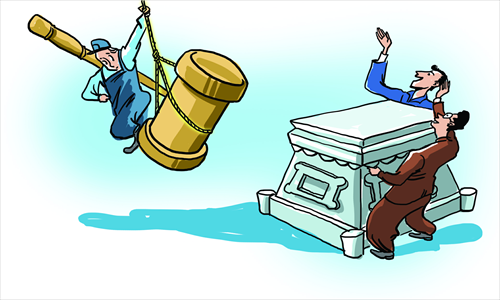
China's leaders face a unique challenge. China's political system has delivered the fastest improvement in standard of living that any society has experienced in recent times. But it is also being closely watched as the public clamors for greater democracy.
Given these unique challenges, China's leaders will have to be unusually creative and innovative in deciding how to change and evolve. Any sudden change in system would be a disaster, as the collapse of the Soviet Union showed.
A sudden and overnight transition to democracy led to a dramatic shrinking of the Russian economy, a collapse in living standards and massive suffering for the Russian people. It would also be a mistake for China's leaders to stand still and not try out reforms of its political system.
As China is developing the world's largest middle class, it is inevitable that this middle class will insist on a greater say in the evolution of China's future. The Chinese political system therefore needs to adopt a "big-tent" approach and include a diversity of voices. At the same time, greater "intra-party democracy," with more elections within the CPC, will also help.
It would also be helpful for the CPC to have a debate on whether China should push for greater democracy or greater rule of law as it seeks to reform its political system. In the West, there is a public consensus that the only road to take is to go for greater democracy. Behind this public consensus, there are growing private doubts about the ability of the democratic system to solve some of the fundamental problems that Western societies face today.
In theory, democracies create a "government of the people by the people and for the people," as then US president Abraham Lincoln said in the Gettysburg Address. In practice, democracies have become governments chosen by the people to support powerful special interests.
The US political system has been taken over by a parasitic set of lobbies that protects special interests over the universal interests of the people. Such a system would be a disaster for China.
While preparing slowly for democracy in the long run, China should move forward instead toward pushing for greater rule of law in the short term. Stronger rule of law will give the Chinese people greater confidence that there is one set of rules that applies equally to both leaders and followers.
This means that while the law courts would sentence an ordinary worker to jail for murder, the same court would also sentence Bogu Kailai for murder. The perception that there is one set of laws applying to all citizens regardless of their rank and position would significantly enhance the legitimacy of the Chinese political system.
Subjecting the more than 80 million members of the CPC to the same rule of law as the regular citizens of China might appear at first glance as a reduction in the power and influence of the CPC. However, if the general public begins to see that CPC members are subject to the same public laws and courts as ordinary citizens, this could paradoxically increase public confidence and trust in the CPC.
Stronger rule of law would also bring other long-term benefits. It would check any arbitrary exercise of power of the local and regional officials. In turn, this will lead to a reduction of regular outbreaks of social unrest.
If people have faith in independent and reliable legal courts to address any grievances they may have, they will be less likely to take to the streets.
Indeed, the best long-term mechanism to reduce the prospects of any emergence of "color" revolutions, such as the ones experienced in Ukraine and Georgia, is to have stronger rule of law.
In trying to strengthen the rule of law, it is important to bear in mind that good laws are easy to find. Good laws have been written for thousands of years. Good men and women to implement the rule of law are harder to find.
One important lesson Singapore has learned is that it is important to find the best people to become judges. It is equally important to pay them well and protect them to ensure they are not tempted or seduced by money or power.
Over centuries, China has built good dikes along the main rivers to prevent great floods from sweeping through the countryside causing great ruin. Similarly, a good army of strong and honest judges can act as a powerful dike to prevent great floods of social and political unrest. Hence, before promoting democracy, China should first promote greater rule of law.
The author is Dean of the National University of Singapore's Lee Kuan Yew School of Public Policy and author of the forthcoming book The Great Convergence: Asia, the West, and the Logic of One World. opinion@globaltimes.com.cn



